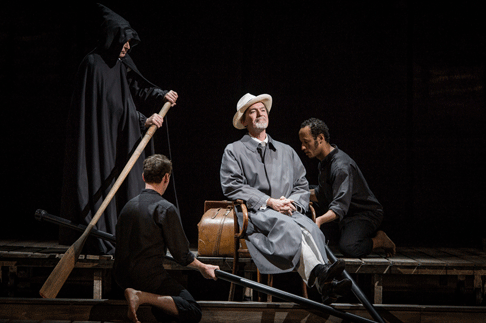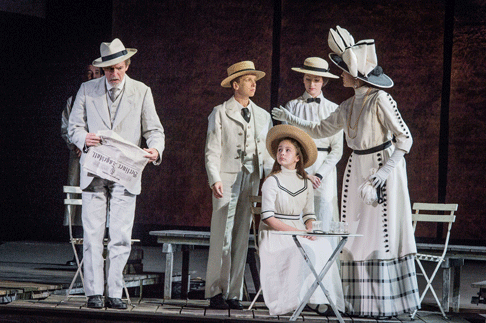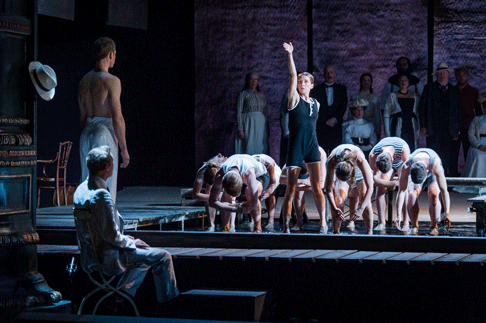The strongest aspect for me is the way Oida economically and simply makes it
palpably clear that the shocking demise that we witness, as esteemed writer,
Gustav von Aschenbach, falls from his literary podium and sinks into disrepute
and decay, is a case of deliberate or subconsciously willed self-destruction.
Fatally lured by his alter ego — a fictitious composite figure, who is a
reflection of Aschenbach’s desires, fantasies and uncertainties, and the very
emblem of what he fears he may himself become — it is clear from the first
that the die is cast for Aschenbach, his fate determined by his own failings:
egoism, repression and self-denial.
So, in Oida’s production, before a note is played the mysterious Traveller
takes his place in the cemetery, awaiting his victim, his overcoat and hat a
mirror image of his prey’s attire. The wreath that he lays, as splash of
colour amid otherwise monotone hues, is both a monument to a deceased
artist’s creative achievement and a mocking foreshadowing of Aschenbach’s
actual death. As the drama ensues, the doppelgänger will at times watch from
the side-lines — symmetrically counter-balancing Aschenbach as he lounges in
his deckchair admiring the foreign tourists who play and parade along the Lido
— and, as he takes his fancy, enter into the action, effortlessly directing
the protagonist to his doom. He does not conceal his deceit, changing his
costume before our eyes. He dons the garish blazer of the Elderly Fop, the
hooded mantle of the Gondolier, the smart suit of the Hotel Manager, the crisp
white overalls of the Hotel Barber and the lurid, velvet checked robe of the
Leader of the Players, but always he is the voice of Dionysus, overpowering
Apollo with his Bacchanalian song.
 Alan Oke as Gustav von Aschenbach, Peter Savidge as the Old Gondolier
Alan Oke as Gustav von Aschenbach, Peter Savidge as the Old Gondolier
At this performance in the Snape Maltings concert hall, baritone Peter
Savidge was absolutely superb as the multifarious tempter. His first phrase,
‘Marvels unfold’ was simultaneously alluring and menacing; his ghastly
falsetto ‘Serenissima’ squeals were disturbingly insincere. Sneering,
Savidge contemptuously emphasised Gustav von Aschenbach as he
‘welcomed’ the writer to his hotel, inferring his scorn for the writer’s
reputation, wounding his already fragile self-worth. The Leader of the
Players’ dissembling crooning whipped up a cacophony of shrieks, the very
laughter of the devil, from the observing restaurant clientele; with rude,
defiant mockery he refused to answer Aschenbach’s enquiries about the plague
infecting Venice’s canals, but his departing, Mephistophelian glower,
unexpected and appalling, left us in no doubt of the peril to be faced.
Imperious and manipulative as the Barber, Savidge ultimately removed his
workday wear to reveal once more the loud stripes of the Elderly Fop’s jacket
and, derisively twirling his ebony cane, presented Aschenbach with a
soul-destroying reflection of himself. The baritone adopted every dramatic and
musical mode with attentiveness and confidence, slipping from persona to
persona with disturbing ease.
Of course the principal spotlight is on Aschenbach himself, and in the title
role tenor Alan Oke sang with compelling dignity and clarity. Despite a
tendency to sing under the note, Oke found a range of colours which drew us
into the character’s experience — no mean feat given the prosaic verbosity
of much of Myfanwy Piper’s libretto, the irony third-person narrative of
Thomas Mann replaced by solipsistic soliloquising. Thus, Oke’s opening
recitatives were delivered in a sensitive mezza voce, and then he
surprised us, booming his own name magisterially, shoring up his own identity
before its imminent and inevitable collapse. When this passage was recalled in
the final scene of the opera, the hollowness of tone was poignantly indicative
of what has been lost.
The opening scenes felt rather slow — but that’s not Oke’s fault,
things don’t really get going musically until the second Act — but he
brought a wonderful, yet frighteningly ominous, relaxation to the
self-admission, ‘So be it, so be it’, when Aschenbach determines to stay in
Venice. Such emotional release rendered the end of Act 1 even more poignant as
Aschenbach splashed in the waters, intoxicated by the alien flood of passion in
which will soon wallow — his ruined shoes a pitiful forewarning of his ruined
heart — before staggering from the stage, in silence, his steps mirrored by
the knowing tread of the Traveller.
 Alan Oke as Gustav von Aschenbach, Emily Mézières as Tadzio, Riikka Läser as A Polish Mother, and Marie-Charlotte Chevalier as the Governess
Alan Oke as Gustav von Aschenbach, Emily Mézières as Tadzio, Riikka Läser as A Polish Mother, and Marie-Charlotte Chevalier as the Governess
The large cast was uniformly assured. As the English Clerk, Damian
Thantrey’s confirmed that the cholera outbreak had taken hold with
indisputable, clarion-like authority. Kathryn Stevens’ lustrous tone was even
more ironic on the second occasion that she tempted Aschenbach with her baskets
of sweet strawberries, the ripe juices now turned to toxin. In the smaller
roles, David Llewellyn (Hotel Porter), Paul Gibson (Hotel Waiter) and Victoria
Sharp (A newspaper-seller) sang with precision and character.
Tom Schenk’s set designs exploit the natural fabrics of the Maltings Hall
for which the production was designed: a russet brick backdrop — perhaps the
disintegrating walls of the buildings that line the putrid Venetian canals —
and plain, raised wooden platforms, suggestive of the decking and promenades of
the Lido. Paule Constable’s lighting scheme swathes the stage in a range of
atmospheric tints: aquamarine blue evokes the glint of sun on glassy waves;
soft yellow warms the youthful beach-side sports; cool purple suggests
Aschenbach’s alienation from the tourists’ relaxed sojourns; blood-red
illuminates the more Hadean moments. Aschenbach’s soliloquies are accompanied
by a shrinking of the span of light to a bright white spot which glares down
directly from above, unsparingly illuminating his self-deceptions and misery.
Sometimes things feel rather too ritualised. Two black-jinbei clad
actors (costumes, Richard Hudson) move chairs and other props with ceremonial
poise, at times miming a gondoliers’ balletic dance, on occasion their
punting poles turning into burning torches, lighting Aschenbach’s passage to
hell. At other points, they seat themselves at the sides or facing upstage,
passive squatting Buddhas. As the Old Gondolier — an ebony-cloaked Charon —
speeds the writer to his destiny, white-clad ferryman enact a slow t’ai
chi-style routine. The dance sequences themselves seem overly long, but
this is probably unavoidable and Daniel Kurz’s choreography effectively
emphasises athletic power and grace; there is nothing sexually suggestive about
the muscular routines, and the playful splashing in the water which laps
beneath the wooden platforms suggests freedom and lightness of spirit.
 Alan Oke as Gustav von Aschenbach, Christopher Ainslie as the Voice of Apollo, Emily Mézières as Tadzio, Dancers: Claire Burrell, Danilo Caruso, Marie-Charlotte Chevalier, Anna Chirescu, Mark Farrant, Daniel James Greenway, Jamie Higgins, Eithne, John Ross, Tom Neill, Pablo Woodward, and the Chorus of Opera North
Alan Oke as Gustav von Aschenbach, Christopher Ainslie as the Voice of Apollo, Emily Mézières as Tadzio, Dancers: Claire Burrell, Danilo Caruso, Marie-Charlotte Chevalier, Anna Chirescu, Mark Farrant, Daniel James Greenway, Jamie Higgins, Eithne, John Ross, Tom Neill, Pablo Woodward, and the Chorus of Opera North
However, I really can’t understand the casting of Tadzio: Emily Mézières
danced with lithe elegance but, while she may be of androgynous physique she
does not possess a male adolescent’s muscular presence. Including female
dancers among the exuberant band of carefree holidaying companions upsets the
balance a little, but would be tolerable; but, Mézières, for all her agility
and physical eloquence simply does not stand out sufficiently from the crowd
— she embodies neither conventional feminine ‘allure’ nor the knowing
charm of a confident male pubescent. Almost asexual, it was not at all clear
why such a figure would drive Aschenbach to self-annihilation.
This anomaly was most striking at the end of Act 1, when Christopher
Ainslie’s imposing, noble Apollo was not just heard but also seen during the
youthful pentathlon: the text he sings, with resonating directness, reminds us
of Plato’s theories of Beauty, but the decision to cast a female dancer as
Tadzio runs counter to the Hellenism in the libretto, a dimension which is
expressed even more strongly in Mann’s novella.
Where the ‘ritual’ does work, however, is during some of the choral and
ensemble scenes. The families from Russia, Germany, Denmark and other nations
are often assembled like a picture postcard or still life, as time stagnates
for Aschenbach while the dancers provide a vigorous counterpoint to his
sterility. During the Dream sequence, the crowds arrange themselves at the
front of the stage, and as Apollo extinguishes his burning staff, his purifying
flames defeated by Dionysus’ licentious energy, the onlookers are infected by
the latter’s dissolution and their rising cries become the unbridled voice of
Aschenbach’s own moral recklessness.
During this Dream passage the playing of the Orchestra of Opera North was
terrifyingly vivid. In the first Act the contrast between the dry pianism which
accompanies Aschenbach’s arioso and the lushness of the ‘Serenissima’
motifs and Tadzio’s gamelan-like exoticism seemed underplayed, and the view
motif scarcely registered. But conductor Richard Farnes pulled out the stops
after the interval, and there was much striking and accomplished playing,
particularly in the instrumental passage at the start of Act 2, with its deep,
dissonant pedal disturbing the orchestral sweetness above.
As he begins, it is with silence that Oida ends. Once the final notes of the
score have faded and the lights have dimmed, Oke rises and leaves the stage
with ponderous resignation; it is hard to imagine closing moments which could
more painfully expose human frailty.
Claire Seymour
Cast and production information:
Gustav von Aschenbach, Alan Oke; Traveller, Peter Savidge; Voice of
Apollo, Christopher Ainslie; English Clerk, Damian Thantrey; A Polish mother,
Rükka Läser; Tadzio, Emily Mézières; Dancers, Claire Burrell, Danilo
Caruso, Marie-Charlotte Chevalier, Anna Chirescu, Mark Farrant, Daniel James
Greenway, Jamie Higgins, Eithne Kane, John Ross; Actors, Tom Neill, Pablo
Woodward; Ship’s steward and Restaurant Waiter, Dean Robinson; Hotel Porter,
David Llewellyn; Lido Boatman and Hotel Waiter, Paul Gibson; A French mother,
Vivienne Bailey; French daughter, Sarah Blood; A German mother, Hazel Croft; A
German father, Stephen Dowson; First American, Peter Bodenham; Second American,
Stephen Briggs; A Polish father, Edward Thornton; A Danish lady, Rachel J
Mosley; An English lady, Miranda Bevin; A Russian mother and A
newspaper-seller, Victoria Sharp; A Russian father, Gordon D Shaw; A Russian
nanny, Cordelia Fish; A guide in Venice, Nicholas Butterfield; A lace-seller,
Sarah Estill; A glass-maker, Campbell Russell; A beggar woman, Claire Pascoe;
Gondoliers, Arwel Price, Jeremy Peaker, Paul Rendall; A priest in St Mark’s,
Edward Thornton; Strolling Players, Gillene Butterfield, Nicholas Watts;
Director, Yoshi Oida; Conductor, Richard Farnes; Revival director; Rob Kearley;
Set designer, Tom Schenk; Costume designer, Richard Hudson; Lighting designer,
Paule Constable; Choreographer, Daniela Kurz; Revival choreographer, Katharina
Bader; The Orchestra of Opera North. Snape Maltings, Aldeburgh, Saturday 2nd November 2013.
![Alan Oke as Gustav von Aschenbach [Photo by Robert Workman]](http://www.operatoday.com/Death-in-Venice-04.gif)


